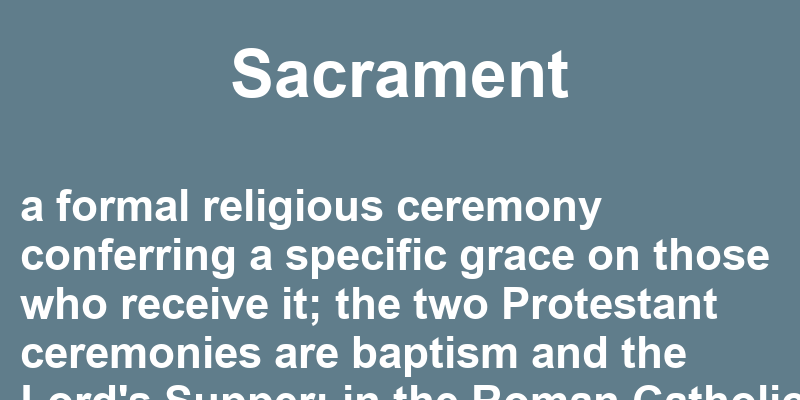Definition of Sacrament
sacrament (noun) - a formal religious ceremony conferring a specific grace on those who receive it; the two Protestant ceremonies are baptism and the Lord's Supper; in the Roman Catholic Church and the Eastern Orthodox Church there are seven traditional rites accepted as instituted by Jesus: baptism and confirmation and Holy Eucharist and penance and holy orders and matrimony and extreme unction
View other definitions
How can sacrament be used in a sentence?
A sacrament is an exterior sign of an interior grace.
Source
nullBut the power of conferring a sacrament is a very great power.
Source
nullThe law takes from me my wife, and leaves me the word sacrament!
Source
nullI then received what they call the sacrament, for the first time.
Source
nullObjection 1: It seems that a sacrament is a sign of one thing only.
Source
nullTherefore a sacrament is a kind of cause rather than a kind of sign.
Source
nullIn general, a sacrament is a tangible sign that helps to effect what it signifies.
Source
nullIt's like, and the Indians, too, using the word sacrament is, I mean, that's what they call it.
Source
nullI realize that you seem to regard it in terms of a religious nature or sacrament, which is fine.
Source
nullDoes anyone doubt that the decreased availability of the sacrament is a strong contributing factor?
Source
nullIt's a constitutional alternative based on religion, so patients can access what we call a sacrament
Source
nullHe's been given what the church calls the sacrament of the sick, you might know it as the last rites.
Source
nullObj. 3: Further, an oath is sometimes called a sacrament: for it is written in the Decretals (Caus. xxii, qu.
Source
nullThe English word "sacrament" comes from the Latin sacramentum, which means primarily an oath, and hence anything sacred.
Source
nullThe Eucharist is often called our sacrament of unity, and deep symbolism of unity is involved in this part of the liturgy.
Source
nullIn a still more particular sense, a sacrament is a celebration by the Church of a specific means of grace instituted by the Lord.
Source
null_I answer that, _ In the sacrament of Baptism, three things may be considered: namely, that which is _sacrament only; _ that which is
Source
nullBut the private communion of the priest with his sacrament was a way of separating clergy from the people, to whom he turned his back.
Source
nullBut now we are speaking of sacraments in a special sense, as implying the habitude of sign: and in this way a sacrament is a kind of sign.
Source
nullBesides the many spiritual benefits of which the sacrament is the channel to every devout believer, it is an ordinance which is particularly helpful to the young.
Source
nullIn ancient times the term sacrament alone was used, but numerous confusions resulted and the similarity of rites and terms led many Christians to regard both as sacraments.
Source
nullAccording to the Vatican, the pope's condition worsened today, so much so he was given what the church calls the sacrament of the sick, what used to be known as the last rites.
Source
nullMeanwhile, a different Vatican official is telling us the pope has received the so-called sacrament of the anointing of the sick, which were once known -- called as a last rite.
Source
nullI wished to go to a certain service of a friend's recently (a baby blessing) but still wished to attend the primary meeting (called sacrament meeting) in the congregation I belong to.
Source
nullGeorge seems to offer proof of the efficacy of this thing we call sacrament, and he manages to hold all the complexity of this great sadness, right here, on this bench, in his tender weeping.
Source
nullThe distinctive grace of the sacrament is the gratia ad robur, grace for strengthening, as the perfection of the grace of Baptism, enabling us to bear witness to the faith - if necessary even unto death.
Source
nullWhen they came to examine the doctrine underlying this practice they all admitted that it was a sacrament, though in the earlier writers the word sacrament had not yet acquired a distinct technical meaning.
Source
nullSanta Clara being attached to the convent of that name, we remained after mass to see the white-robed sisters receive the sacrament from the hands of a priest, by the small side-door that opens from the convent to the church.
Source
nullBabblers, preachers, extravagant controversialists! endeavor to remember that your master never announced that the sacrament was the visible sign of an invisible thing; He has nowhere admitted four cardinal virtues, and three divine ones.
Source
nullConsequently a sacrament is a sign that is both a reminder of the past, i.e. the passion of Christ; and an indication of that which is effected in us by Christ's passion, i.e. grace; and a prognostic, that is, a foretelling of future glory.
Source
nullIt would be rash, of course, to infer immediately from the expression, "This is a great sacrament", that marriage is a sacrament of the New Law in the strict sense, for the meaning of the word sacrament, as already remarked, is too indefinite.
Source
nullThe other leading Protestant of the day, Martin Luther, wrote: "Since marriage has existed from the beginning of the world and is still found among unbelievers, there is no reason why it should be called a sacrament of the New Law and of the church alone."
Source
nullAlthough fewer Catholics are seeking what's officially known as the sacrament of anointing of the sick, those who do want it could be at risk of reaching their final hours without the prayer-whispering presence of a Roman-collared priest unless they plan ahead.
Source
nullArab _Ar'ab_, not _arab_ arid _ar'id_ asphalt _asfalt_, not _fawlt_ bade _bad_ catch not _ketch_ defalcate _defal'kate_, not _fawl_ dilletante _dilletan'te_ forbade _forbad_ granary _granary_ program _pro'gram_, not _grum_ rapine _rap'in_ rational _rational_ sacrament _sacrament_
Source
nullThe name sacrament cannot be cited as satisfactory evidence, since it did not acquire until a late period the exclusively technical meaning it has to-day; both in pre-Christian times and in the first centuries of the Christian Era it had a much broader and more indefinite signification.
Source
nullSince it is both the end of Lent and the beginning of Easter, the rite begins in violet vestments, the color of penance, but ends in white, the color of Easter, and of the baptismal garments, for in antiquity this sacrament was administered as far as possible on this night, or at Pentecost.
Source
nullHowever, there is a difference, because, since the other sacraments are accomplished in the use of the matter, the receiving of the sacrament is the actual perfection of the sacrament; whereas this sacrament is accomplished in the consecration of the matter: and consequently both uses follow the sacrament.
Source
nullWhen I have found disputants I less respected, I have sometimes taken pleasure in raising their hopes by my concessions: they are charmed when I agree with them in the number of the sacraments; but are horridly disappointed when I explain myself by saying the word sacrament is not to be found either in Old or New Testament; and one must be very ignorant not to know it is taken from the listing oath of the Roman soldiers, and means nothing more than a solemn, irrevocable engagement.
Source
nullEven the Canonists themselves were never able to put forward any coherent and consistent ground for the indissolubility of matrimony which could commend itself rationally, while Luther and Milton and Wilhelm von Humboldt, who maintained the religious and sacred nature of sexual union -- though they were cautious about using the term sacrament on account of its ecclesiastical implications -- so far from believing that its sanctity involved indissolubility, argued in the reverse sense.
Source
nullGospel, the Nicene Creed, and a number of other matters, including the elevation of the host, but not for worship, [Note 9] he proceeds to the next part of the Treatise which is headed "How to _administer the most holy sacrament to the people," [Note 10] and his first sentence is the following: "Let this much suffice to be said of the _Mass_, and service of the minister; we will now proceed to treat of the manner in which the holy _sacrament_ shall be administered to the people, for whose benefit especially the Supper of our Lord was instituted."
Source
null
Tips for Using sacrament in a Sentence
You may have an easier time writing sentences with sacrament if you know what words are likely to come before or after it, or simply what words are often found in the same sentence.
Frequent Predecessors
Words that often come before sacrament in sentences. For example: "the sacrament" or "a sacrament"
- the
- a
- blessed
- holy
- this
- and
- that
- of
- last
- or
Frequent Successors
Words that often come after sacrament in sentences. For example: "sacrament of" or "sacrament ."
- of
- .
- is
- in
- and
- to
- was
- as
- at
- with
Associated Words
Words that aren't necessarily predecessors or successors, but are often found in the same sentence.
- unction
- penance
- anointing
- eucharist
- eucharistic
- matrimony
- adoration
- absolution
- benediction
- baptism
Alternate Definitions
- sacrament (noun) - an oath of obedience and fidelity taken by roman soldiers on enlistment; hence, any oath, solemn engagement, or obligation, or ceremony that binds or imposes obligation
- sacrament (noun) - in <em>theology</em>, an outward and visible sign of inward and spiritual grace; more particularly, a solemn religious ceremony enjoined by christ, or by the church, for the spiritual benefit of the church or of individual christians, by which their special relation to him is created or freshly recognized, or their obligations to him are renewed and ratified
- sacrament (noun) - the eucharist, or lord's supper: used with the definite article, and without any qualifying word
- sacrament (transitive verb) - to bind by an oath
- sacrament (noun) - the oath of allegiance taken by roman soldiers; hence, a sacred ceremony used to impress an obligation; a solemn oath-taking; an oath
- sacrament (noun) - the pledge or token of an oath or solemn covenant; a sacred thing; a mystery
- sacrament (noun) - one of the solemn religious ordinances enjoined by christ, the head of the christian church, to be observed by his followers; hence, specifically, the eucharist; the lord's supper

